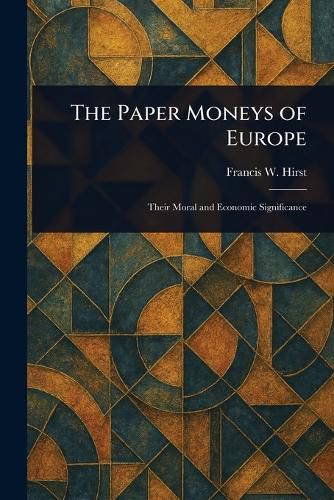Readings Newsletter
Become a Readings Member to make your shopping experience even easier.
Sign in or sign up for free!
You’re not far away from qualifying for FREE standard shipping within Australia
You’ve qualified for FREE standard shipping within Australia
The cart is loading…






This title is printed to order. This book may have been self-published. If so, we cannot guarantee the quality of the content. In the main most books will have gone through the editing process however some may not. We therefore suggest that you be aware of this before ordering this book. If in doubt check either the author or publisher’s details as we are unable to accept any returns unless they are faulty. Please contact us if you have any questions.
Explore the fascinating history and economic implications of "The Paper Moneys of Europe: Their Moral and Economic Significance" by Francis W. Hirst. This meticulously prepared print edition delves into the currency question, examining the introduction and impact of paper money across Europe. A classic exploration of finance and economics, this book provides valuable insights into the development of monetary systems and their broader social consequences. Hirst's work analyzes the moral and economic significance of paper currency, offering a historical perspective relevant to understanding contemporary financial landscapes. Perfect for readers interested in European history, international economics, and the evolution of currency, this book offers a compelling look at the rise of paper money and its lasting effects.
This work has been selected by scholars as being culturally important, and is part of the knowledge base of civilization as we know it.
This work is in the public domain in the United States of America, and possibly other nations. Within the United States, you may freely copy and distribute this work, as no entity (individual or corporate) has a copyright on the body of the work.
Scholars believe, and we concur, that this work is important enough to be preserved, reproduced, and made generally available to the public. We appreciate your support of the preservation process, and thank you for being an important part of keeping this knowledge alive and relevant.
$9.00 standard shipping within Australia
FREE standard shipping within Australia for orders over $100.00
Express & International shipping calculated at checkout
This title is printed to order. This book may have been self-published. If so, we cannot guarantee the quality of the content. In the main most books will have gone through the editing process however some may not. We therefore suggest that you be aware of this before ordering this book. If in doubt check either the author or publisher’s details as we are unable to accept any returns unless they are faulty. Please contact us if you have any questions.
Explore the fascinating history and economic implications of "The Paper Moneys of Europe: Their Moral and Economic Significance" by Francis W. Hirst. This meticulously prepared print edition delves into the currency question, examining the introduction and impact of paper money across Europe. A classic exploration of finance and economics, this book provides valuable insights into the development of monetary systems and their broader social consequences. Hirst's work analyzes the moral and economic significance of paper currency, offering a historical perspective relevant to understanding contemporary financial landscapes. Perfect for readers interested in European history, international economics, and the evolution of currency, this book offers a compelling look at the rise of paper money and its lasting effects.
This work has been selected by scholars as being culturally important, and is part of the knowledge base of civilization as we know it.
This work is in the public domain in the United States of America, and possibly other nations. Within the United States, you may freely copy and distribute this work, as no entity (individual or corporate) has a copyright on the body of the work.
Scholars believe, and we concur, that this work is important enough to be preserved, reproduced, and made generally available to the public. We appreciate your support of the preservation process, and thank you for being an important part of keeping this knowledge alive and relevant.